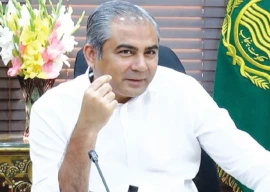
CJP was critical of the attorney for Walters Power International, Shahid Hamid, who claimed that the corruption charges against his client were false.
Hamid contended that the federal cabinet approved the Naudero-1 and Naudero-2 power plants project in January 2010. Justice Chaudhry, however, was not impressed. “If the federal cabinet approves anything illegal, the act will not be legal,” he said. The CJP added that if power plants were set up without due process, they were not legitimate.
The CJP was also critical of Hamid’s defence that the president inaugurated the plants: “Do not take the name of President Asif Ali Zardari to hide your fraud, he is not concerned with such technical things. You used the name of the president to gain publicity. Inauguration is a symbolic ceremony that anyone can do, we also hold such ceremonies and are often invited at occasions for inaugurations,” he said.
(Read: SC’s campaign against corruption)
CJP also pointed out that a Commercial Operation Date was not registered and signed. “Public Procurement Regulatory Authority (PPRA) rules have been violated,” CJP said. “The projects cannot be termed legal if initiated without being advertised. Therefore the rental power projects can be declared void if proved non-transparent.”
Hamid admitted that there might be irregularities in the project, but he was adamant that the corruption charges against his client were false.
Explaining the losses of the Walter power company, its counsel said that two units of Naudero-1 were stopped in July 2010. Each unit was producing 25 megawatts of electricity. The plants were repaired more than three times, causing the company $8 million loss. However, they were not paid a single penny for repair and maintenance of the plants, the attorney contended.
When CJP pointed out from the report that the National Electric Power Regulatory Authority (Nepra) did not inspect the plant – as required under the policy for setting up power plants – Nepra’s counsel said that the project was not advertised but that Nepra has the right mechanisms to inspect how many electricity units are produced against how much gas. The case continues today.
(Read: Court demands electricity tariff comparison of IPPs, RPPs)
Published in The Express Tribune, November 2nd, 2011.
COMMENTS (2)
Comments are moderated and generally will be posted if they are on-topic and not abusive.
For more information, please see our Comments FAQ





1732436825-01732688207-0/BeFunk_§_]__-(47)1732436825-01732688207-0.jpg)

1732688687-5/Copy-of-Untitled-(95)1732688687-5-270x192.webp)









@Cautious: if u r a foreign investor u must have a panel of Legal Advisory. Its their job to this kind of work... To choose the things that r legal...
So a businessman can't rely on the approval of the govt or it's representatives to have a valid contract? What are the long term consequences of that? If I am a foreign investor do I now have to have CJP personal validation to make my agreement binding?